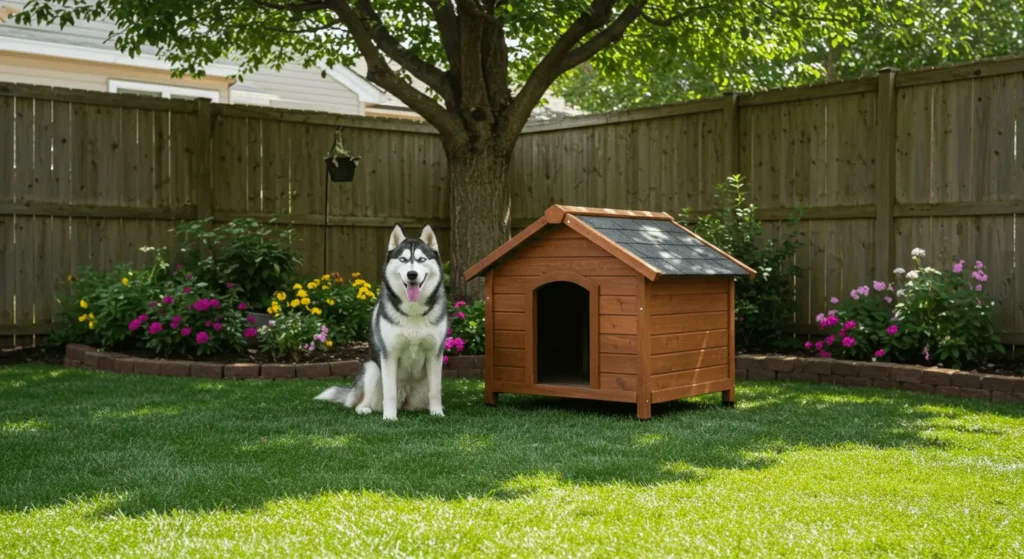As a Husky owner, it’s key to know about the average husky dog age and siberian husky lifespan. Several factors, like genetics, health, nutrition, and lifestyle, affect a Husky’s life span. Knowing these can help you care for your Husky better.

Learning what affects a Husky’s lifespan helps you make better care choices. Diet, exercise, and vet visits all matter for their health. By focusing on your Husky’s needs, they can live a long, happy life.
Table of Contents
Introduction to Husky Longevity
Discovering the average siberian husky lifespan and husky dog age shows the value of tailored care. Recognizing your Husky’s unique needs lets you create a care plan that supports their health and longevity.
Key Takeaways
- Understanding the average husky dog age and siberian husky lifespan is essential for providing proper care.
- Genetics, health, nutrition, and lifestyle all impact a Husky’s lifespan.
- Regular veterinary check-ups are vital for maintaining your Husky’s health.
- A balanced diet and regular exercise support overall wellbeing.
- Recognizing the unique needs of your Husky helps create a personalized care plan.
- Prioritizing your Husky’s needs can help them live a long and healthy life.
Understanding the Average Husky Dog Age
Thinking about getting a husky as a pet? One key question is how long do huskies live. Their lifespan can change based on genetics, health, and lifestyle. Huskies usually live between 12 to 15 years. But, with the right care, some can live up to 18 years or more.

To grasp the average husky lifespan, compare them to other breeds. Huskies are known to live long, but their life span can be affected by diet, exercise, and health. Knowing these factors helps you ensure your husky lives a long, healthy life.
Typical Lifespan Range for Huskies
Huskies typically live between 12 to 15 years. But, their lifespan can vary. Genetics, health, and lifestyle play big roles.
Comparing Husky Longevity to Other Breeds
Huskies live longer than many breeds of similar size. Large breeds might have shorter lives due to health issues. Smaller breeds often live longer because of their size.
Factors That Determine Life Expectancy
Several things can affect a husky’s life span. Genetics, health, diet, exercise, and lifestyle are key. By understanding these and taking steps to improve them, you can help your husky live a long, healthy life. This way, you can confidently answer how long do huskies live.
The Genetic Blueprint of Husky Longevity
Exploring the world of huskies reveals the importance of their genetic blueprint for longevity. Their aging process is shaped by their genes, which greatly influence their lifespan. Knowing the genetic factors that affect a husky’s life can help you care for them better, ensuring they live longer and healthier.
The genetic blueprint of husky longevity is intricate, involving many genes that work together to determine their lifespan. Research indicates that specific genetic variants can make huskies more likely to face certain health issues. For example, some may be more prone to hip dysplasia or eye problems due to their genes.
To grasp the genetic factors that shape the aging process of huskies, consider these key points:
- Genetic predisposition to certain health issues
- Inherited traits that affect lifespan
- Role of genetics in determining life expectancy
Understanding the role of genetics in a husky’s aging process is crucial. It allows you to take steps to ensure your pet’s well-being. This includes a balanced diet, regular exercise, and routine vet visits to catch health problems early.
Remember, every husky’s genetic blueprint is unique, and their aging process is influenced by both genetics and environment. By addressing these factors, you can help your husky enjoy a long, happy, and healthy life.
| Genetic Factor | Impact on Lifespan |
|---|---|
| Genetic predisposition to health issues | Increased risk of certain health problems |
| Inherited traits | Affect lifespan and overall health |
| Role of genetics in determining life expectancy | Significant influence on an individual dog’s lifespan |
Critical Health Issues Affecting Husky Lifespan
As a husky owner, knowing about health issues is key. Understanding husky puppy growth stages and life expectancy of husky breed helps spot problems early. Regular vet visits and a good diet are crucial.
Huskies can face hip dysplasia, eye issues, and hypothyroidism. Choosing a reputable breeder who tests parents can lower disease risk. Also, keep your husky’s vaccinations and parasite control up-to-date to prevent illnesses.
Being proactive about health can ensure your husky lives long and well. Watch for signs like changes in appetite or energy. With the right care, your husky can thrive and live a happy life, no matter their husky puppy growth stages.
Some key health issues to watch for include:
- Hip dysplasia
- Eye problems, such as cataracts or progressive retinal atrophy
- Hypothyroidism
- Heart problems, such as dilated cardiomyopathy
Nutrition’s Role in Your Husky’s Life Expectancy
As a responsible dog owner, you want your husky to live a long, healthy life. A key part of senior husky care tips is giving them a balanced diet. This diet should meet their nutritional needs.
A balanced diet for a husky includes protein, fat, and complex carbs. You can choose between commercial dog food or homemade meals. Always talk to your vet to find the best diet for your pet. Look for dog food with omega-3 fatty acids, vitamin D, and antioxidants.
- Feed a high-quality dog food that meets your husky’s nutritional needs
- Avoid overfeeding, as obesity can lead to various health problems
- Consider adding supplements to your husky’s diet, but only after consulting with your veterinarian
By following these senior husky care tips and providing a balanced diet, you can help your husky live a long and healthy life. Always get personalized advice from your vet on caring for your pet.
Exercise and Mental Stimulation Requirements
As a husky owner, you know how crucial it is to keep your pet active and mentally sharp. Regular exercise and mental games are key to your husky’s health and happiness. They help extend their husky dog age and siberian husky lifespan.
To keep your husky happy and healthy, daily exercise and mental games are a must. Activities like:
- Daily walks and runs
- Playtime in the yard or park
- Mental games, such as puzzle toys and obedience training
By giving your husky the exercise and mental challenges they need, you boost their husky dog age. A well-exercised and mentally sharp husky is less likely to have behavioral issues. They’ll live a longer, healthier life, maximizing their siberian husky lifespan.
Daily Exercise Needs
Your husky’s exercise needs depend on their age, size, and health. Most huskies need at least 30 minutes of exercise daily. This can be split into shorter sessions throughout the day.
Mental Enrichment Activities
Mental games are as important as physical exercise for your husky’s health. These activities keep their mind active, reducing boredom and behavioral problems.
Impact on Longevity
Regular exercise and mental games greatly impact your husky’s lifespan. By providing the right physical and mental stimulation, you can increase their husky dog age. This improves their quality of life and maximizes their siberian husky lifespan.
| Age | Daily Exercise Needs | Mental Enrichment Activities |
|---|---|---|
| Puppy (0-1 year) | 30 minutes, 2-3 times a day | Puzzle toys, obedience training |
| Adult (1-7 years) | 30-60 minutes, 1-2 times a day | Agility training, scent work |
| Senior (7+ years) | 30 minutes, 1 time a day | Short walks, gentle play |
Environmental Factors and Living Conditions
When thinking about how long huskies live, we must look at their environment and living conditions. As a husky owner, you are key in making a safe and healthy space for your pet. This means giving them enough room, socializing them well, and keeping them safe from extreme weather.
Some important things to think about include:
- Climate: Huskies love cold weather but can get heatstroke in the heat. Make sure they have shade, cool water, and a comfy spot to rest.
- Living space: Give your husky enough room to move, play, and exercise. A big living area can help reduce stress and prevent bad behavior.
- Socialization: Huskies are pack animals and need to meet people, other dogs, and new places. This helps them learn good social skills.
Understanding how environment and living conditions affect your husky’s life can help you create a better home for them. This can lead to a longer, happier life for your pet.

Remember, every husky is different, and they may have unique needs. By giving them a safe, healthy, and loving home, you can help them thrive. This increases their chances of living a long, happy life.
Preventive Healthcare and Regular Veterinary Care
As a husky owner, you are key to your pet’s health. Regular vet visits are crucial to catch health problems early. This can greatly affect your husky’s lifespan.
Preventive care, like vaccinations and dental care, keeps your husky healthy. Vaccines protect against diseases like rabies and distemper. Your vet may also suggest non-core vaccines based on your dog’s lifestyle.
Vaccination Schedule and Dental Care
- Core vaccines: rabies, distemper, parvovirus
- Non-core vaccines: Lyme disease, leptospirosis
- Dental care: regular brushing, dental cleanings
Regular health checks can spot problems early. By teaming up with your vet, you can give your husky the best care. This can help them live longer and happier.
Special Care Requirements for Senior Huskies
As your husky ages, it’s key to know about the husky puppy growth stages. They go from puppy to adult and then to senior. Senior huskies need special care to stay healthy and happy. You should watch for age-related changes like less mobility and health issues.
Changing your care routines for your senior husky is important. This means creating a comfy environment, adjusting their diet, and regular vet visits. Senior husky care tips can guide you in caring for your aging pet.
Age-Related Changes
When your husky gets older, you’ll see changes in their behavior and health. Some common changes include:
- Less energy
- Weight changes
- Appetite changes
- Less mobility
Adapting Care Routines
To keep your senior husky happy and comfortable, adjust your care routines. This includes:
- Getting them a comfy bed
- Changing their diet
- Regular vet visits

Quality of Life Considerations
As your husky ages, think about their quality of life. Make choices that focus on their comfort and happiness. This means creating a supportive environment, managing health issues, and giving them the care they need.
| Age | Care Requirements |
|---|---|
| 7-10 years | Regular vet visits, diet changes, comfy bed |
| 10-13 years | More vet care, health issues, exercise changes |
| 13+ years | Health checks, managing health, focus on comfort |
Conclusion: Maximizing Your Husky’s Years Through Dedicated Care
Thelife expectancy of the Husky breedvaries based on several factors. Understanding what affects a Husky’slifespanhelps you care for them better. This way, your furry friend can live a long, healthy, and happy life.
Feeding your Husky right, giving them enough exercise, and regular vet visits are key. Also, watching for health problems and treating them quickly is important. This can greatly extend your Husky’s life.
Every Husky is different, needing unique care. Stay involved in your pet’s health, get advice from experts, and adjust your care as needed. With love and the right care, your Husky can live a long, joyful life with you.
FAQ
What is the average lifespan of a Husky?
Huskies usually live between 12 to 15 years. Many live well into their mid-teens. But, their lifespan can vary. This depends on genetics, health, nutrition, and lifestyle.
How do Huskies compare to other dog breeds in terms of longevity?
Huskies live longer than many breeds. For example, Labradors live about 10-12 years. German Shepherds live 9-13 years on average. Huskies’ long life is due to their health and adaptability.
What are the key factors that determine a Husky’s life expectancy?
Genetics, health, nutrition, exercise, and mental stimulation are key. Environmental conditions and preventive healthcare also matter. Proper care can extend your Husky’s life.
What are some common genetic health conditions that can affect a Husky’s lifespan?
Hip and elbow dysplasia, eye disorders, and neurological conditions are common. Regular vet visits and early detection can manage these issues. This can help your Husky live longer.
How does nutrition play a role in a Husky’s life expectancy?
Proper nutrition is vital for a Husky’s health and longevity. A balanced diet supports their immune system and joints. It prevents weight issues that can shorten their life.
What are the exercise and mental stimulation requirements for Huskies, and how do they impact their lifespan?
Huskies need regular exercise and mental stimulation. Daily physical activity and mental games keep them healthy. This can positively affect their lifespan.
How do environmental factors and living conditions affect a Husky’s lifespan?
Environment and living conditions greatly impact a Husky’s life. Climate, outdoor space, and socialization affect their health and lifespan.
What are the preventive healthcare and regular veterinary care measures that can help extend a Husky’s lifespan?
Preventive care, like vaccinations and dental hygiene, is crucial. Regular health screenings help catch issues early. Working with your vet ensures your Husky gets the best care.
What special care considerations are important for senior Huskies?
Senior Huskies need special care. Provide a comfortable home, manage health issues, and adjust exercise and mental stimulation. This ensures a good quality of life.

